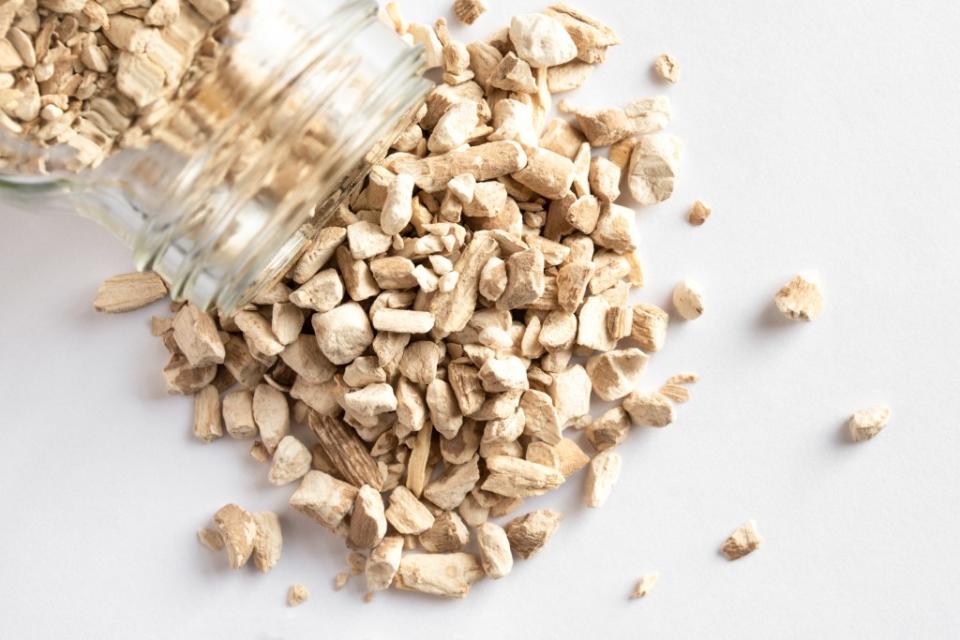I’m a doctor — patients won’t stop asking about these 2 adaptogens

Has the secret to stress-free living been here all along?
In the never-ending quest to fend off feelings of exhaustion, one craze that’s taken the wellness world by storm has ancient roots — literally.
Yes, we’re talking about adaptogens, the herbs, roots and plants that will allegedly help our bodies manage stress and restore balance after tough situations, according to UCLA Health. Many of these potions and pills have been around for thousands of years — but have only recently become ultra trendy.
“Adaptogens are really interesting because [they’re] a little bit vague, but essentially they are a combination of herbs and roots and other plants, like mushrooms,” Dr. Natasha Bhuyan, a primary care provider with One Medical in Phoenix, tells The Post. “And the idea is they’re supposed to restore balance in our body and help our bodies manage stress. But people in the adaptogen industry say that it affects every single person differently.”

These herbs won’t cause any harm — by definition adaptogens need to be nontoxic at regular doses — but they also might not be the magic mushroom you’re looking for. Meaning that you’re just wasting your money on the wellness world’s latest snake oil.
Bhuyan says many patients in her practice seek advice for anxiety or stress. And there’s almost never a silver bullet solution.
“When you think about stress, there isn’t often one underlying cause,” Bhuyan explains. “Sometimes stress is certainly emotional or related to mental health. Other times stress can be physical, hormonal [or] influenced by our relationships. What we’re eating or drinking, our sleep patterns, our work situation or financial status. So if you think about it, how can one adaptogen possibly address all of these underlying factors?”
Still, some small studies have shown positive results from taking an adaptogen — at least in the short term.
“Some people have a benefit. And you have to wonder, is this a placebo effect, or is the adaptogen actually playing a role in regulating your stress?” Bhuyan questions.
Despite the shaky evidence, two adaptogens come up again and again in her practice: ginseng and ashwagandha. Before you give them a shot (or swallow), here’s what to know about each.
Ginseng

Used for thousands for years to improve overall health, ginseng is one of the top adaptogens that Bhuyan says her patients can’t stop asking about.
Proponents claim it can do everything from lower blood sugar to fight inflammation in the body. Some studies have also shown that ginseng may help in stress relief and improve immune function.
“People are looking for ways to not feel fatigued. People say, ‘Give me a pill, give me something to make me feel awake and alive,’ ” Bhuyan says.
On the energy front, one small study from nearly a decade ago showed that the root could help people manage chronic fatigue. Another study from 2018 demonstrated that Korean ginseng had a positive cognitive effect on people doing memory tests over the course of six months.
In short, more research is needed, but there’s some promising evidence for this ancient root.
Ashwagandha

This ancient plant has been studied a number of times — but current research says it’s hard to draw conclusions because most of the studies have been small, and preparations of the plant vary from study to study.
“It’s supposed to help reduce anxiety and give people a calming effect,” Bhuyan says. “And so I have people that will take it before bed and it helps them sleep. And, you know, if that’s the case, I think that is fine. But ashwagandha is not the solution to all of our stress and anxiety.”
After anecdotal reports of people experiencing melatonin “hangovers” — feeling groggy the morning after taking the popular sleep aid — it’s no wonder that wellness seekers are looking for a different fix.
Like many other adaptogens, there haven’t been any long-term studies done on ashwagandha to determine how safe it is. Research says it’s safe for up to three months — but if you’re chronically stressed out, ashwagandha may not be able to help you.
Before you pop these pills…

If you have high blood pressure, diabetes, or take medication for depression or a thyroid condition, talk to your doctor first before you start dabbling with herbs, Bhuyan says. Experts also note you should avoid ashwagandha if you’re pregnant or breastfeeding.
And although you can try supplements to battle your fatigue and fight your insomnia, Bhuyan emphasizes that it’s essentially just a band-aid solution.
She encourages people to think about the root cause — rather than looking for a quick fix with a supplement or pill.
“What are the other things that we can do to reduce your stress, improve your sleep, and then ultimately, alleviate your fatigue?” Bhuyan asks. “We can throw supplements and medications at anything, but let’s actually try to treat the underlying issue.”

